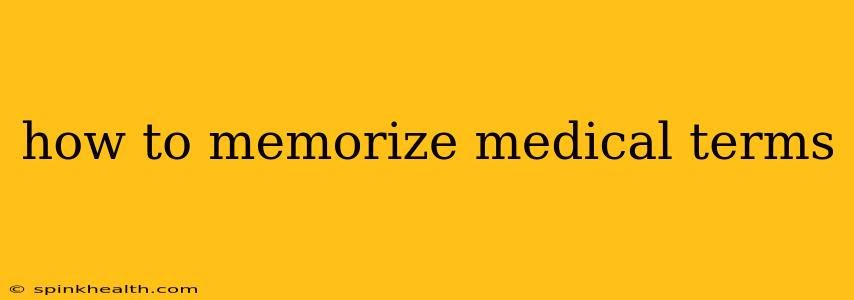How to Conquer the Medical Terminology Mountain: A Memorable Journey
The world of medicine is filled with a seemingly endless landscape of complex terms. For medical students, doctors, nurses, and even curious individuals, memorizing these terms can feel like scaling a daunting mountain. But fear not! This isn't about rote memorization; it's about building a system that makes learning medical terminology not only possible, but enjoyable and effective. My journey into the fascinating world of medical vocabulary began with frustration, but evolved into a strategy built on understanding and clever techniques. Let me share my secrets with you.
Understanding the Roots, Prefixes, and Suffixes: The Building Blocks of Medical Language
Many medical terms aren't random strings of letters. Instead, they're built from smaller components: roots, prefixes, and suffixes. Understanding these building blocks is the key to unlocking the meaning of countless terms. Think of it like learning Lego instructions – once you understand the individual pieces, you can build anything!
For example, consider the word "cardiomyopathy." "Cardio" relates to the heart, "myo" refers to muscle, and "pathy" indicates disease. Therefore, cardiomyopathy means a disease of the heart muscle. Learning these core components drastically reduces the number of individual terms you need to memorize. Focus on understanding the etymology—the origin and history of words—to truly grasp their meaning.
What are some effective techniques for memorizing medical terms?
This is a question many aspiring medical professionals grapple with. There's no single "magic bullet," but combining several techniques yields the best results.
-
Flashcards: The classic method remains highly effective. Write the term on one side and its definition, along with a simple image or mnemonic device (more on that later), on the other. Regularly review them, focusing on terms you find challenging. Spaced repetition systems (like Anki) can optimize your review schedule.
-
Mnemonic Devices: These memory aids are powerful tools. Create silly sentences, rhymes, or acronyms to associate the term with its meaning. For example, to remember "osteoporosis" (porous bones), you could picture a skeleton with holes.
-
Visual Aids: Diagrams, charts, and images are invaluable. Seeing a visual representation of a term can significantly improve recall. For example, associating the term "hepatomegaly" (enlarged liver) with a visual of an enlarged liver can make it stick.
-
Active Recall: Instead of passively rereading definitions, actively test yourself. Try to define terms from memory before looking at the answers. This strengthens your neural connections and improves retention.
-
Teach Someone Else: Explaining a concept to another person solidifies your understanding. Teaching forces you to articulate your knowledge, identifying any gaps in your understanding.
-
Use Context: Encountering medical terms within their natural context—in textbooks, articles, or case studies—reinforces their meaning.
How can I make the process of learning medical terminology more engaging and less overwhelming?
The key is to make it a gradual and enjoyable process, rather than a grueling marathon.
-
Break it Down: Don't try to memorize everything at once. Focus on smaller, manageable chunks of information.
-
Set Realistic Goals: Establish achievable daily or weekly goals to avoid burnout.
-
Find a Study Buddy: Learning with a friend can make the process more fun and motivating.
-
Use Different Learning Styles: Experiment with different techniques to discover what works best for you.
-
Reward Yourself: Celebrate your progress with small rewards to stay motivated.
Are there any apps or software that can help with memorizing medical terms?
Yes! Several apps and software programs are designed specifically for learning medical terminology. These often incorporate spaced repetition and other effective learning strategies. Research different options to find one that suits your learning style.
What are some common mistakes to avoid when trying to memorize medical terms?
-
Relying solely on rote memorization: This is inefficient and often ineffective.
-
Trying to learn too much at once: Overwhelm leads to frustration and poor retention.
-
Ignoring the etymology: Understanding the root words unlocks the meaning of many terms.
-
Not actively testing yourself: Passive review is less effective than active recall.
Conquering medical terminology requires a strategic approach and consistent effort. By using a combination of techniques, embracing active learning, and focusing on understanding rather than mere memorization, you can transform this challenge into a rewarding journey of intellectual discovery. Remember, it's a marathon, not a sprint. Be patient with yourself, celebrate your progress, and enjoy the process of unlocking the language of medicine.

